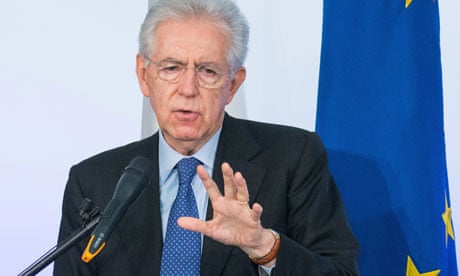Mario Monti says he will consider returning as prime minister of Italy after elections in February – and has launched a stinging attack on Silvio Berlusconi, who brought down his technocratic government this month.
Monti, commenting on the attacks on his austerity programme, as well as the offers he has had to lead a new centre-right coalition, said: "I am struggling trying to follow [Berlusconi's] line of thinking."
While throwing his hat back into the ring, Monti refused to name parties he would ally with, merely stating that he would consider politicians who sign up to a programme of reforms he wanted carried out in Italy.
"I would be ready to offer my appreciation, encouragement, and if asked, leadership" to parties that backed the programme, he said, adding that it would soon be posted online.
Monti said he would not join a party ticket before the election, but added: "If one or more political forces who adhere to the programme propose me as a candidate for prime minster, I would consider it."
His keenly awaited speech, following his resignation as technocrat premier on Friday, partly cleared up the confusion surrounding Italy's return to fully democratic government after Monti's appointment last November.
But he left doubt over whether he would front a coalition of centrist parties, including the descendant of the Christian Democrats, which has been lobbying him to stand as their leader.
Monti is unlikely to win the election, and his statement allows him time to see how the centrist parties fare in the polls. Italy's centre-left Democratic party, which has asked Monti not to stand, is leading the polls. In an interview published by La Repubblica on Friday, Monti criticised the centrists: "They have been politicians since they were children and people can't tolerate professional politicians anymore," he said.
By not committing, the former EU commissioner has also left open the door to becoming Italy's next president in 2013.
He was surprisingly fierce in his criticism of Berlusconi, who pulled his support for Monti this month, triggering his resignation, and who this weekend condemned Monti's government as a "complete disaster".
Monti said Italians could "hold their heads high" after his government implemented fiscal restraint to restore Italy's credibility following Berlusconi's resignation in November 2011.
He said his new programme promoted collaborating with the EU to improve Italy's future, as opposed to Berlusconi's constant attacks on the bloc. A simple "slap on the back" in Europe would not get results, Monti added, an apparent reference to his rival's bonhomie at summits.
Monti also warned against dropping a controversial property tax that Berlusconi was campaigning against, adding that scrapping it would only result in reintroducing it doubled the following year.
A much-needed anti-corruption law had been "impoverished" by Berlusconi's opposition, he said, warning that Italy required laws on false accounting and conflicts of interest.
Monti also called for the next government to undertake a "drastic simplification" of the country's labour laws and a strengthening of the reforms launched by his government. He advised the Italian left to accept laws to open key sectors of the economy.
"I hope Italy does not need to be saved every year," he said in reference to his 13-month administration, and urged politicians to focus on the next generation rather than the next election.
